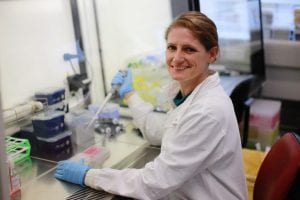
As part of our #BristolUniWomen campaign to mark International Women’s Day 2021, we’re meeting women from across the University of Bristol community who have been using their expertise to tackle the pandemic, from carrying out world-class research to helping on the frontline of the NHS.
Dr Laura Rivino is an immunologist and Senior Lecturer in the School of Cellular and Molecular Medicine.
Your research has focused on COVID-19 recently. Could you tell us a little more?
My team is studying the immune response to SARS-CoV-2 which causes COVID-19. We are interested in understanding the immune changes that occur during COVID-19 and the long-term immunological effects of the infection after recovery. We are also interested in studying the generation of immunological memory of T cells towards SARS-CoV-2 following natural disease (COVID-19) and COVID-19 vaccination.
What have been the biggest challenges or triumphs for you during the pandemic?
It has been extremely exciting to be involved in the collaborative work within Bristol UNCOVER and impressive to see at the start of the pandemic how quickly Bristol scientists joined forces to tackle research questions. Recently we have also joined the UK-Coronavirus Immunology Consortium (UK-CIC) and it is really inspiring to work with UK immunologists as well as in the multidisciplinary Bristol UNCOVER group. The pandemic has also brought challenges – I’d only been at the University for six months, having moved from Singapore in July 2019. We had just finished setting up our dengue virus research in a containment level 3 (CL-3) lab when we had to shut it down because of COVID-19. It has been a struggle to get it up and running again particularly with CL-3 lab space constraints due to the increased COVID-19 research.
Personally, it has been really challenging to juggle kids and increased pressures at work, but I have had a lot of support from my husband and also from the kid’s school and our new community here. It is in these times that I’ve appreciated that Bristol is a great place to live.
What is it like being a woman in academia? Have there been times when you have either faced inequality or had to challenge it?
I find it really exciting to be a woman in academia, particularly in this time of change and having the opportunity to contribute to this change. The second is a difficult question and the honest answer is I don’t know. I can think of only two occasions when I have felt discriminated as a woman, but I will never know for sure if that was the case. This is the invisible nature of gender inequality; it is hard to see it as you can never verify that someone is not given an opportunity because they are a woman. Also, I feel many women in my generation and before me struggle to promote themselves compared to men so this doesn’t help.
Which women have inspired you in your career?
There are two women that inspired me during my earlier career, both were my supervisors or co-supervisors during my Master’s degree and PhD. Since then, I’ve mostly worked with men –some equally inspiring! Today amazing women colleagues at Bristol and overseas continue to inspire me and the environment in our School is really supportive towards women. Our Head of School, Professor Anne Ridley, is also a successful female scientist and leader.
What advice would you give to your 13-year-old self?
There are several pieces of advice I would give to my hot-headed teenage self! Professionally I am proud of the roads I have travelled, my career path has not been entirely linear, and I have made mistakes and bad choices too, but these have formed me as a supervisor and scientist.
What are you most proud of?
Professionally, I am proud of the work we – myself and my team – have done so far and of the collaborations I have established with other teams internationally and in the UK. Collaborations do not always work, and you need chemistry and trust to bring teams together. But when collaborations do work it’s an incredible fun experience and long-term collaborations can become really fruitful.
